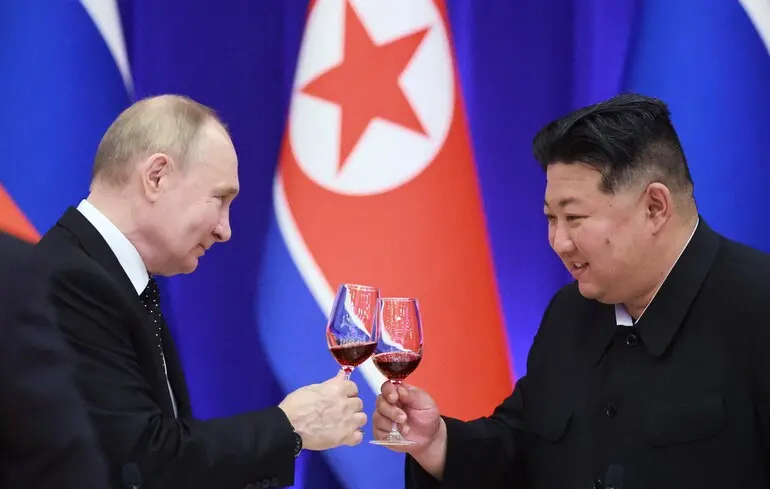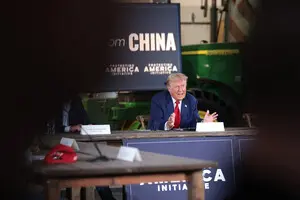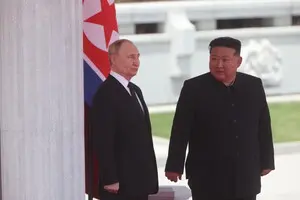Nuclear conflict. Will Trump Stop Russia’s Tandem with North Korea?

Russia's overt aggression against Ukraine has acquired new quality after North Korea entered the war. This is how the participation of DPRK military forces in the confrontation with the Ukrainian Armed Forces should be viewed, and it does not matter whether we are talking about the Kursk region of the Russian Federation or the territory of Ukraine itself. Most importantly, in addition to thousands of containers with weapons, thousands of DPRK soldiers have traveled to Russia. During her recent visit to Moscow, North Korea's foreign minister said that the DPRK would stand by Russia until it wins its “holy war.” Meanwhile, the parliaments of both countries have ratified the strategic partnership agreement signed in June, the terms of which, in fact, provide for a defensive alliance. This agreement itself, as well as the DPRK's actions, are a blatant violation of UN Security Council resolutions on North Korea, and therefore were strongly condemned not only by Ukraine but also at the level of the G7, the EU and NATO. In order to predict the consequences of this step, it is important to understand the motivation of the parties and predict their possible further actions.
After coming to power in Russia, Putin has been consistently building relations with the DPRK for more than two decades. Starting in 2000, even before he was “elected” president with the blessing of both Boris Yeltsin and Bill Clinton, Putin visited the DPRK and signed a treaty of friendship, good neighborliness and cooperation with the father of its current leader, Kim Jong Il. It was in 2000 that North Korea received its first small batch of enriched uranium. Since then, Moscow and Pyongyang have been nearing a strategic partnership that has now acquired the unprecedented character of a de facto defensive alliance. For Russia, the DPRK is an ideal tool for influencing the security situation in East Asia, a zone of critical interest for the United States, the EU and China. Using Kim Jong Un's phobias, his de facto isolation and the DPRK's poverty, it is a simple and relatively inexpensive task to stimulate or slow down Pyongyang's aggressive rhetoric and actions. Meanwhile, the benefits are obvious: by engaging North Korea, it is quite possible to keep the United States and its allies on their toes, whilst also proving your value and “strategic foresight” to China.
From the DPRK's point of view, the presence of US armed forces in the region is a threat to the existence of the Kim Jong Un regime. Moreover, over the past four years, security dialogue in the US-South Korea-Japan triangle has gradually intensified. The continuation of missile and nuclear programs requires resources, and China, which has always been a major trading partner and source of assistance, is opposed to the DPRK's nuclear program.
It is important to take into account that after the years of the pandemic, the DPRK's economy grew by 3.1% in 2023, trade by 74.6% (123.9% in 2022), exports by 104.5%, imports by 71.3%, and among the main trading partners, China remains the undisputed leader, but there are also the Netherlands and Poland, albeit with small volumes. Of course, the current account balance is not in favor of the DPRK, but the country is clearly striving to improve its economic standing. Strategic relations with Russia, which does not adhere to sanctions and is ready to increase both economic and military-technical cooperation with North Korea (although, as a permanent member of the UN Security Council, it should strictly adhere to the sanctions regime), are extremely important for Pyongyang. Among other factors, the partnership with Russia also opens up the possibility of maneuvering in the complicated relations with the PRC. The death of a certain number of DPRK soldiers in the war against Ukraine is not an obstacle for Kim Jong Un, and the export of significant amounts of weapons is certainly profitable.
Japan has vehemently condemned the deployment of the North Korean contingent to the territory of the Russian Federation. Active consultations in bilateral and trilateral formats with the United States and South Korea have taken place, and measures to monitor the DPRK's military activities were stepped up. Tokyo is clearly aware of the escalation of the potential danger associated with the DPRK's receipt from Russia of cutting-edge technologies in the field of missile construction, experience in modern warfare, including the use of drones, and preparation for possible provocations, such as the launch of ballistic missiles towards Japan. Over the past three years, the DPRK has regularly launched missiles of various classes and ranges that could threaten Tokyo. The Japanese capital even announced a missile threat on two occasions. The aggressive actions of the DPRK are one of the main reasons for the implementation of rearmament programs for Japan’s Self-Defense Forces and the creation of technical capabilities not only for a retaliatory but also for a pre-emptive strike in the future. At the same time, Tokyo has a clear understanding that an armed conflict with the DPRK could well escalate into a real war, which could be joined by China and Russia, in accordance with their treaty obligations. On the other hand, not only in Japan, but also in the entire East Asian region, there is an active discussion of a scenario in which the new US administration decides to refrain from participating in another conflict (on the Korean Peninsula), and one with a bad history in retrospect. If the DPRK does indeed obtain, as predicted, the technology to produce ICBMs with a range that would allow them to reach the United States, this would mean a high probability of a full-scale nuclear conflict. It is not yet clear which scenario would suit Donald Trump.
Given the DPRK's participation in the war against Ukraine, South Korea is the most vulnerable party in terms of escalation of the security situation in the region. Despite the powerful defense complex, the US military contingent on its territory and round-the-clock monitoring of any military activity in the DPRK, Seoul cannot but take into account the extreme proximity of North Korean weapons and the vulnerability of the ROK territory. Despite Seoul's many years of efforts to normalize relations, Pyongyang has now taken steps that have completely ruined all lines of communication between the North and the South. Kim Jong Un has declared South Korea his number one enemy. In addition to the DPRK's missile program, Seoul is also concerned about the program to create a drone production facility, which could become a serious threat given Russia's experience of using Shahed drones against Ukraine. Currently, South Korea is also holding consultations and negotiations with the United States and Japan to develop joint steps in the event of an unexpected escalation. Of course, the key is the position of the United States, which has a commitment to defend the ROK. According to Japanese experts, Kim Jong Un is unpredictable and behaves very defiantly, constantly provoking South Korea. This may indicate the existence of certain agreements, especially with Russia. It is extremely difficult to predict what reason the DPRK leader might come up with to attack the ROK, as has happened in history. It is not forgotten that the first DPRK constitution of 1948 named Seoul as its capital. Too many analogies can be seen in the current situation with the events on the Korean Peninsula in 1947–1950, including the weakness of the UN to resist attempts to start conflicts.
In the current situation, China has chosen a position of non-interference. All comments on the participation of DPRK soldiers in the war against Ukraine boil down to the fact that China cannot influence the relations between two sovereign states — Russia and North Korea — and therefore refrains from both approving and condemning their interaction. Beijing, according to Chinese officials, “has consistently advocated for the cessation of hostilities and the establishment of peace.” This position of China is seen in the region as irresponsible for a country that claims to be a global player.
In fact, according to experts familiar with the situation in Beijing, the PRC is not happy with North Korea's involvement in the war at all. China's main interest, which is at the center of its foreign policy, is the economic factor. At the present stage, China's economy is far from being in the best shape (economic experts point to the disproportionate growth of ideological factors in regulating investment, monetary and production policies over economic ones). Under these conditions, a war in East Asia, and one involving “external” players such as the United States and Russia, threatens to become a global crisis with no winners. On the other hand, until there is a dialog with the new US administration, China has no incentive to interfere in the relations between two of its strategic partners waging a war against the third.
The US position is undoubtedly central to the North Korea issue. In 2018–2019, Donald Trump met with Kim Jong Un three times, but the controversy over the DPRK's missile and nuclear programs was not resolved. Pyongyang has cut off contacts with Washington ever since. The current situation is different from the realities of Trump's first term. Back then, the problem of North Korea could be considered more or less independently of other US challenges in strategically important regions of the world. However, now it is becoming closely linked to Russia's war against Ukraine in Europe, and is taking place against the backdrop of a significant deterioration in relations with South Korea, which threatens the entire East Asia, and all this is without taking into account the development of the DPRK's cooperation with Iran.
Russia and the DPRK are united by the belief that the West, represented by the United States and NATO, is an existential threat to their regimes, and Russia is trying to take advantage of this “unity” to win a place on the geopolitical Olympus, particularly at the expense of North Korea's military capabilities. For its part, the DPRK thus receives additional and quite solid security guarantees, as Kim Jong Un believes. Obviously, for the sake of its own goals, Russia will no longer restrain the DPRK's nuclear ambitions, as it did before, thus giving an impetus to nuclear proliferation, which seems inevitable in this scenario.
Will the United States be able to control this type of escalation, if it failed to do so even in a simpler situation? According to Japanese analysts, by crossing the most dangerous line of all, Putin is actually going all-in to demonstrate the inability of the rules-based international order to maintain international peace if certain “tough” states rebel against it. It is concluded that the policy of “controlled escalation” pursued by the United States in response to Russia's aggression against Ukraine has not led to a positive result. Delaying the provision of all necessary weapons to Ukraine has allowed Putin to implement his plan to involve the DPRK in the war, and now “controlled escalation” will be needed in Europe and East Asia at once. In the face of a real nuclear threat, we should stop making mistakes. The time for testing geopolitical theories is over. We need to act.
Please select it with the mouse and press Ctrl+Enter or Submit a bug














 Login with Google
Login with Google